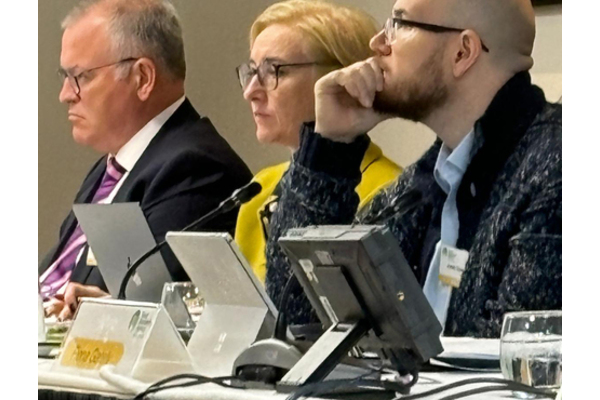On the 18th of September, 2024, Marika Graham-Woods, Managing Director of the CTA, attended the FSA Board Meeting in Peterborough, chaired by Professor Susan Jebb.
The meeting proved to be a critical moment for the UK's struggling CBD industry, with a powerful message delivered by the CTA regarding the ongoing challenges faced by the sector as a result of the Novel Foods (NF) process.
A Shocking Revelation for the FSA Board
The assembled FSA Board appeared taken aback as Marika Graham-Woods delivered a stark assessment of the current state of the CBD sector. Over the last five years, the NF process has led to significant delays, resulting in the shrinking of the UK's legitimate CBD market by a staggering 40%. What should have been a booming industry, projected to be worth £2.2 billion by 2024, has instead stagnated, with no approved consumer CBD products available on the market over the last 5 years!
Mrs. Graham-Woods highlighted the frustration of businesses that have been eager to comply with regulations but are stifled by the slow and cumbersome NF process. She voiced the CTA's concerns, stating:
"Is the role of a Government body to stifle industry? How has the glacial Novel Food process protected consumers from substandard or harmful unregulated CBD products, supported consumer choice, or helped to build a regulated CBD industry?"
This stark question resonated and shocked the FSA Board, as it underscored the disillusionment of businesses trying to operate within the legal framework while the market suffers as a direct result of a damaging and ineffective regulatory process.
Chief Scientific Officer’s Call for Collaboration
Amid the challenging realities presented by the CTA, there was a glimmer of hope. Professor Robin May, the Chief Scientific Officer of the FSA, expressed a willingness to work more closely with the CTA and other trade bodies to expedite the gathering of safety data across different CBD product types.
The safety and efficacy of CBD products have long been a point of contention, and the CTA has been actively pushing for more nuanced assessments of various CBD formats. This includes a call to separate the evaluation of isolated CBD from full-spectrum and distilled products, as the latter types have been shown to demonstrate lower toxicity and justify higher acceptable daily intakes (ADIs) than the advised 10 mg.
Mrs. Graham-Woods articulated this point clearly during the meeting:
"A key issue is the very low ADI of 10mg per day based on the lowest values in a single isolated CBD dossier, which ought not to be blanket applied to distilled and full-spectrum products that show lower toxicity at much higher ADIs. Can a review of the ADI for Consumer CBD foodstuffs across different CBD types be added to the ACNFP Agenda for annual review as more data becomes available?"
A Path Forward for CBD Regulation?
In a potentially positive turn of events, Professor Susan Jebb, Chair of the FSA Board, requested that the CTA formally write to her with suggestions on how to expedite the NF process for CBD products. The Board recognised the urgency of the situation and indicated that January 2025 could be a target date for accelerating the regulatory framework.
This development is critical. The UK’s CBD industry is teetering on the edge, and without swift intervention, the sector risks further contraction, with many businesses facing closure. Mrs. Graham-Woods' remarks captured this sentiment powerfully:
"Our members wish to be regulated. Their businesses are suffering due to rogues and pirates. If the NF process cannot be speeded up, regulated companies may throw their hands up and say ‘why bother’? The FSA, Trading Standards, and the ASA have no teeth, and the sector is literally dying waiting to be regulated!"
The industry's desire to operate within a legal framework is clear, but the regulatory bodies responsible for enforcement have struggled to keep pace. Without urgent reforms, there is a real risk that legitimate businesses will abandon their efforts to comply, leaving the market vulnerable to unscrupulous operators.
Moving Forward: What Comes Next?
As the meeting drew to a close, Marika Graham-Woods reaffirmed the CTA's commitment to working with the FSA to ensure that the CBD sector is properly regulated. The CTA has already submitted industry questions to the ACNFP (Advisory Committee on Novel Foods and Processes), and Marika Graham-Woods requested from the FSA Board that these be answered promptly to provide clarity to the sector.
"Firstly, I am heartened to hear the developments being made over the last 18 months by the FSA. I’d like to say to the assembled Board, as a Trade Association, we have always offered support and knowledge to the FSA and will continue to do so."
The CTA's willingness to collaborate with regulatory bodies is crucial to the sector's survival. As the FSA moves towards a January 2025 deadline for expediting the NF process, it is hoped that the efforts of trade bodies like the CTA will be recognised and supported.
The next few months will be critical as the FSA, the ACNFP, and the CTA work together to develop a regulatory framework that protects consumers while allowing legitimate businesses to thrive. If successful, this collaboration could mark the beginning of a new era for the UK’s CBD market – one that is both well-regulated and sustainable.










